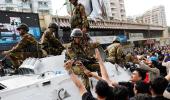Bangladesh is in turmoil, which is not good news for India, which shares a porous 4,000 km border with it.
There is a danger of fundamentalism growing there, and India has to move in to reset its ties with the new dispensation before China and Pakistan make capital out of it, alerts Ramesh Menon.

The overthrow of the Sheikh Hasina government in Bangladesh is a lesson for all autocrats who have little respect for those whom they claim to govern.
This was waiting to happen. We did not know when the volcano of people's feelings would burst.
In a population of 170 million, there were 30 million youth who were jobless. The economy has not been growing but shrinking in the last three years.
There was a 44 per cent fall in forex reserves in the same period. Bangladesh's currency dropped by 28 per cent, threatening to fall further.
Inflation had climbed to 9.7 percent, and was pinching all.
Hasina misread the protests. She unleashed the security forces to crush it, ending up with over 400 killed and thousands injured.
She even got her Awami League supporters to attack the students.
She called the protesters terrorists when it was an upsurge by the youth frustrated with numerous issues like unemployment, corruption, and inflation.
For many years now, Bangladesh has seen a regime that cared little for human rights, electoral propriety, rampant corruption, and an autocratic regime that thought it was the only way to rule.
Hasina trampled opposition that boycotted elections in protest, saying it did not have a level playing field. Former Prime Minister Khaleda Zia was arrested.
So were numerous activists like Dr Muhammad Yunus, 84, a Nobel Laureate who founded the Grameen Bank on corruption charges when he opposed Hasina's policies.
After the last elections in January 2024, labelled mainly as rigged, she lost her political legitimacy.
But she read it as victory sweeping back to power for the fourth time in a row, belittling the Opposition.
Her Awami League won 224 of the 300 seats as the Opposition boycotted the election, saying she had violated democratic norms. Many political analysts worldwide said it was an unfair election.
The United States, the United Kingdom and international human rights groups said it was an unfair election, but India congratulated Hasina.
But with the army and media on her side, Hasina thought she could continue to steamroll through.
Hasina rubbished protests by students against a quota system in government jobs, which set aside 30 per cent for descendants of the freedom struggle, calling them anti-national.
She did not see that a simple student protest against a quota system for jobs would snowball into a nationwide movement calling for her removal.
The quota agitation was forgotten; it metamorphosed into one against corruption, human rights, and liberty.
As she held the reins of power for 15 years, the Narendra Modi government cultivated Hasina wanting to settle vexatious border issues and crack down on Indian insurgents from the north-east who used Bangladesh as its operational pad to orchestrate attacks on security forces in states like Nagaland, Manipur, Assam and other northeastern states.
Hasina did settle border disputes and got after Indian insurgents who were backed by both Pakistan and China. She also reined in fundamentalist elements and militancy.

Suddenly, India faces a major foreign policy challenge in its neighbourhood as it might have to deal with a dispensation that is not inclined to lean on to India and might be exploited by both China and Pakistan.
India will have to move quickly to engage the new dispensation in Dhaka.
India had ignored the mass protests in Bangladesh, saying it was purely internal and not wanting to rub Hasina the wrong way.
Yunus, who is going to head an interim government, remarked that he was disappointed with the Indian stand, saying that when a brother's house is on fire, one expects the neighbour to come and help.
Now, it has to grapple with a careful reboot in ties as it has to build bridges with Khaleda Zia's Bangladesh Nationalist Party and the Jamaat-e-Islami, who are not at all positively disposed towards India.
India must acknowledge the importance of democracy and its values and understand the people's anger if it has to water down the prevailing anti-India sentiment.
India will have to show that it has distanced itself from Hasina and genuinely empathises with the aspirations of the youth while condemning attacks on minorities by radical groups that are taking advantage of the situation.
Hindu establishments and temples have been attacked, but it will not be by the students but by elements close to Jamaat-e-Islami that have close links with Pakistan.
Islamic fundamental parties in Bangladesh will try to dig in their heels using the current crisis to increase their vote share and influence. This will not be good news for India.

India will have to tread carefully as it has a 4,000 km border with Bangladesh that is essentially porous and has helped thousands of Bangladeshis to cross over and find jobs in India.
It has been an election issue in Assam for decades.
There are over 19,000 Indians in Bangladesh, and 9,000 of them are students.
India would want stability and restoration of democracy with fresh elections to reach out to the new dispensation and repair the damage.
It will need a lot of political and diplomatic tightrope walking as the mass protests had an anti-Indian flavour as India was silent, not wanting to upset Hasina, whom they wanted out.

Hasina had a particular corner for India as it helped her father, Sheikh Mujibur Rehman, liberate erstwhile East Pakistan to emerge as an independent nation called Bangladesh in 1971.
Her last visit to India was in June, during which she had cordial meetings with Modi and other political leaders like Sonia Gandhi.
But her heady, autocratic ways ended up destroying her father's legacy as angry students defaced and vandalised his statues.
It seems impossible for Hasina now to return to Bangladesh. Her era has come to an inglorious end.
Hasina brought reforms to ensure secularism was a fundamental tenet of Bangladeshi polity.
She had worked to improve ties with India and had built connectivity and trade links.
The development indices of Bangladesh had started to look better than India.
But when history is written, she will be known more for her authoritarianism and her contribution to diluting democracy and the erosion of civil liberties and political rights.
It will discuss how she used the Digital Security Act, a draconian law, to muzzle free speech across media platforms.
Hasina had an excellent opportunity for the last 15 years to make Bangladesh one of the most prosperous economies in Asia.
But with her blundering after power with an iron hand, she also destroyed the legacy of her father, Sheikh Mujibur Rahman, who led the Bangladesh liberation movement and was revered for what he did and sacrificed as he was assassinated in 1975 during a military coup.
Angry young protesters who had not seen the saga of what it took to get independence from Pakistan vandalised his statues.
Will Bangladesh be able to order fresh elections, keep the army away, and once again show the promise of growth and change that it earlier did? It all depends on the students to steer it towards the right path.
Student bodies have clarified that they do not want the army to rule the country again.
What is required is a credible interim government designed by Yunus and others that will cleverly ensure the unconditional support of the army and the people for things to stabilise, infrastructure to be rebuilt, and wounds to be healed.
It could also resume talks on a Free Trade Agreement that will benefit India and Bangladesh, India's fourth largest exporting destination.
India's exports to Bangladesh in 2023-2024 were around $11 billion.
A peaceful neighbour is in India's economic and security interests as it cannot have one more neighbour raise a threat on the eastern border.
If order is restored and a sane government takes over the reins, Bangladesh can emerge again as a rising South Asian economy.
It would also steer the country towards its earlier goals of being a liberal and secular democracy.

There were reports that Hasina left China hours before her scheduled departure. Some attributed it to her pique at the Chinese Communist leadership; others to a personal crisis.
Whatever, in three weeks, Hasina was no longer her country's prime minister. Photograph: Vincent Thian/Pool via/Reuters
While Yunus gets busy trying to piece together an interim government and the army grapples with trying to contain the continuing violence, the signs emanating from Bangladesh are ominous.
Twenty leaders of the Awami League have been found dead.
This should concern the new dispensation, as widespread vandalism and looting of homes and businesses belonging to Awami League supporters have been targeted. Some of their houses were set on fire.
One shocking instance was the torching of the Zabeer International Hotel in Khulna, owned by Shahin Chakladar, general secretary of the Jashore district Awami League, killing 24 people.
Nearly 100 houses and shops belonging to minority communities were attacked, vandalised and looted. Around ten temples were attacked.
Lumpen elements have taken over, and the role of Pakistan, which desperately wants a foothold in erstwhile East Pakistan, cannot be ruled out.
Veena Sikri, who was a former Indian high commissioner in Bangladesh, said there were external influences as there was a lot of anti-Indianism in the protests.
Bangladesh has witnessed such large-scale violence for the first time since its independence.
Ramesh Menon, award-winning journalist, educator, documentary film-maker and corporate trainer, is the author of Modi Demystified: The Making Of A Prime Minister.
Feature Presentation: Aslam Hunani/Rediff.com











 © 2025
© 2025